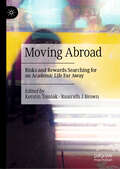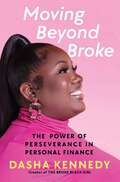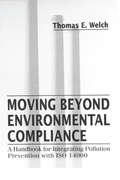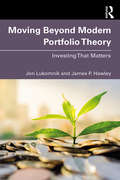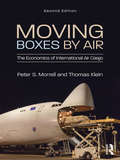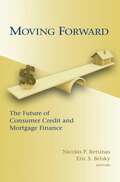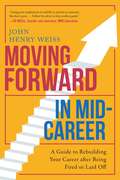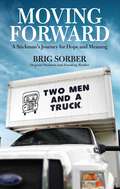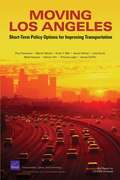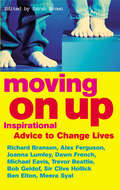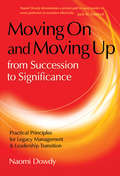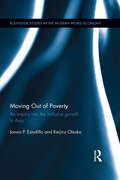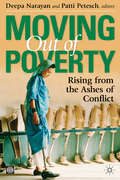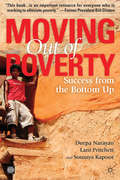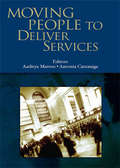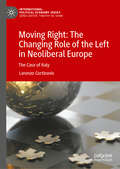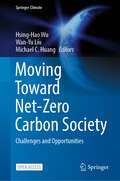- Table View
- List View
Movers, Shakers, Mommies, and Makers: Success Stories from Mompreneurs
by Gibbs M. SmithEleven entrepreneurial women share their stories of balancing motherhood with starting their own businesses in this inspiring anthology.Motherhood is a full-time job—and so is starting a business from the ground up. Attempting to do both at once can seem daunting, but as these firsthand stories of success demonstrate, it really can be done. In their own words, eleven mom-entrepreneurs tell their stories of transforming their businesses from side-projects in craft-rooms and garages to nationally recognized brands. While each of their stories is unique, these women all speak of the leap of faith required to make their dreams come true. They all share what they learned as their businesses—and children—grew. Now the furniture, clothing, toys, diaper bags, and other products these women create can be found in stores across the country, including at major retailers such as Nordstrom and Walmart.
MoviePass
by Willy ShihMitch Lowe, the CEO of MoviePass, was having trouble convincing people of the viability of the company's business model. The company was building a multi-sided platform, and was planning to extract value from increasing traffic to movie theaters through a number of mechanisms. It also appeared to making assumptions around its flat-rate pricing model. By making some assumptions, this case affords an opportunity for students to practice with discovery-driven planning.
MoviePass: The "Get Big Fast" Strategy
by Daniel Fisher Benjamin C. EstyIn August 2017, MoviePass dramatically lowered its subscription price from $50 per month to just $10 for up to one movie per day. The idea was to rapidly scale the business to the point where it could generate incremental revenue streams from related businesses (e.g., a share of ticket and concession revenues from theaters, advertising revenue from movie studios; and revenue from ride-sharing companies). Within two days, Moviepass had gotten 150k new subscribers; within six months, it had more than 2 million. But as of February 2018, the company faced three challenges: theaters were resisting the concept, investors were shorting the stock in record numbers as losses mounted, and competitors were beginning to appear. Could CEO Lowe convince investors that the company was viable and it could, indeed, monetize the growing subscriber base? At the same time, Lowe had to decide whether to raise subscription prices to cover the growing losses or keep prices low to grow the subscriber base as quickly as possible.
Movile: Building a Global Technology Company
by Lynda M. Applegate Eric Werker Andrew Otazo Arnold B. PeinadoCase
Moving Abroad: Risks and Rewards Searching for an Academic Life Far Away
by Kerstin Tomiak Ruairidh J BrownThis book investigates a different way to gain academic job experience and start an academic career. With universities training more PhD candidates than there are academic jobs, the academic job market, particularly in the social sciences and humanities, is somewhat broken. A possibility for young PhD graduates and early career researchers to gain job experience in an ever more competitive job market is leaving their home countries and taking a job far from home. Academics move from the countries of the so-named global South to Europe and the USA, from the USA to Europe and vice versa, and increasingly also from the so-called "western World“ to Asia, Africa, and the Middle East. Grounded in the personal experience of the editors and the chapter contributors, the book argues that there are more ways into academia and than the traditional route. Gathering the experiences of academics who have been moving to work in foreign places, among them Pakistan, Poland, China, the United Kingdom, Afghanistan, Portugal, and New Zealand, the book offers diverse and rich perspectives on academic mobility. What awaits the moving academic abroad, how to prepare for this move and what are the challenges and rewards in the foreign classrooms are questions the chapter contributors and editors reflect upon, ultimately wishing to help others decide whether to take this jump into the unknown.
Moving Beyond Broke: The Power of Perseverance in Personal Finance
by Dasha KennedyIn the vein of Get Good with Money and The Black Girl&’s Guide to Financial Freedom, an accessible, witty, and necessary guide from the beloved creator of The Broke Black Girl that addresses the unique financial issues of Black women and others shut out of traditional finance conversations. Dasha Kennedy grew up in a family where finances were not discussed. At fifteen, she already had bad money habits that would follow her into adulthood. At nineteen, she realized that the Fortune 500 executives who promote financial literacy did not look or sound anything like her. And she knew she couldn&’t be the only person who felt as lost and overlooked as she did when it came to money management. So, she started the website The Broke Black Girl and discovered an entire community of people who were desperate for money advice and understanding. Now, Kennedy provides the ultimate user-friendly resource, featuring engaging and relatable stories from her own personal finance journey. With actionable advice and an engaging voice, she helps us take control, move past shame and anxiety, build family wealth in a single generation, and become financially independent forever.
Moving Beyond Environmental Compliance: A Handbook for Integrating Pollution Prevention with ISO 14000
by Thomas Elliott WelchSince the U.S. Department of Energy (as well as other Federal and International agencies) will stop granting contracts to companies that fail to comply with 14000 standards, the search is on for any book that will make 14000 compliance easier. Tom Welch, with more than 20 years experience in environmental engineering and project management, provides such a book! Moving Beyond Environmental Compliance: A Handbook for Integrating Pollution Prevention with ISO 14000 is the first text to combine the best aspects of Pollution Prevention (P2), Total Quality Management (TQM), and ISO 14000, into a comprehensive "how-to" guidebook for achieving environmental compliance.The ever-increasing cost of environmental compliance as it is passed onto consumers, cuts into the profit margin and reduces an organization's competitive edge. At the very least, compliance cuts into operating budgets, and directs attention away from the primary business of an organization. This handbook demystifies the implementation of effective environmental management systems as described in the ISO 14000, and clarifies the application of effective pollution prevention methodologies that can drastically reduce this compliance burden.
Moving Beyond Modern Portfolio Theory: Investing That Matters
by James P. Hawley Jon LukomnikMoving Beyond Modern Portfolio Theory: Investing That Matters tells the story of how Modern Portfolio Theory (MPT) revolutionized the investing world and the real economy, but is now showing its age. MPT has no mechanism to understand its impacts on the environmental, social and financial systems, nor any tools for investors to mitigate the havoc that systemic risks can wreck on their portfolios. It’s time for MPT to evolve. The authors propose a new imperative to improve finance’s ability to fulfil its twin main purposes: providing adequate returns to individuals and directing capital to where it is needed in the economy. They show how some of the largest investors in the world focus not on picking stocks, but on mitigating systemic risks, such as climate change and a lack of gender diversity, so as to improve the risk/return of the market as a whole, despite current theory saying that should be impossible. "Moving beyond MPT" recognizes the complex relations between investing and the systems on which capital markets rely, "Investing that matters" embraces MPT’s focus on diversification and risk adjusted return, but understands them in the context of the real economy and the total return needs of investors. Whether an investor, an MBA student, a Finance Professor or a sustainability professional, Moving Beyond Modern Portfolio Theory: Investing That Matters is thought-provoking and relevant. Its bold critique shows how the real world already is moving beyond investing orthodoxy.
Moving Boxes by Air: The Economics of International Air Cargo
by Peter S. Morrell Thomas KleinAir cargo is a key element of the global supply chain. It allows outsourcing of manufacturing to other countries and links production in both multinational and smaller enterprises. It has also been the most important driver of certain export industries in countries such as South Africa, Kenya and Chile. As a component of the air transport industry, air cargo makes the crucial difference between profit and loss on many long-haul routes. This second edition of Moving Boxes by Air offers a comprehensive and up-to-date guide to the business and practices of air cargo, with chapters dedicated to key issues such as current trends, market characteristics, regulation, airport terminal operations, pricing and revenues, and environmental impacts. The book illustrates the recent emphasis on mergers at the expense of alliances, which have not had the impact that they had on passenger operations. The section on security has been expanded to assess in more depth the threats to aircraft from terrorists, particularly in the lower cargo and passenger baggage compartments. Surcharges are examined and the book considers whether all airlines will follow the lead of some to do away with both fuel and security surcharges. The book concludes with a summary of the latest industry forecasts. Fully updated throughout, this edition is the definitive guide to air cargo for professionals within both the aviation and freight industries.
Moving Forward
by Eric S. Belsky Nicolas P. RetsinasThe recent collapse of the mortgage market revealed fractures in the credit market that have deep roots in the system's structure, conduct, and regulation. The time has come for a clear-eyed assessment of what happened and how the system should be strengthened and restructured. Such reform will have a profound and lasting impact on the capacity of Americans to use credit to build assets and finance consumption. Moving Forward explores what caused the crisis and, more important, focuses on the path ahead. The challenge remains the same as ever: protect consumers, ensure fairness, and guarantee soundness of the financial system without stifling innovation and overly restricting access to credit and consumer choice. Nicolas Retsinas, Eric Belsky, and their colleagues aim to stimulate debate based on analysis of the opportunities and challenges presented by the various components of global capital markets: financial engineering, risk assessment and management, specialization of financial intermediation, and marketing methods. The contributors--leaders in business, government, academia, and the nonprofit sector--discuss new research and ideas about the future of credit markets, including how improvements might be shaped by industry leaders.Contributors: John Y. Campbell, Harvard University; Marsha J. Courchane, Charles River Associates; Ren Essene, Federal Reserve Board; Allen Fishbein, Federal Reserve Board; Howell E. Jackson, Harvard Law School; Melissa Koide, Center for Financial Services Innovation; Michael Lea, San Diego State University; Eugene Ludwig, Promontory Financial Group; Brigitte C. Madrian, Harvard Kennedy School; Nela Richardson, Joint Center for Housing Studies of Harvard University; Rachel Schneider, Center for Financial Services Innovation; Peter Tufano, Harvard Business School; Peter M. Zorn, Freddie Mac
Moving Forward
by Eric S. Belsky Nicolas P. RetsinasThe recent collapse of the mortgage market revealed fractures in the credit market that have deep roots in the system's structure, conduct, and regulation. The time has come for a clear-eyed assessment of what happened and how the system should be strengthened and restructured. Such reform will have a profound and lasting impact on the capacity of Americans to use credit to build assets and finance consumption. Moving Forward explores what caused the crisis and, more important, focuses on the path ahead. The challenge remains the same as ever: protect consumers, ensure fairness, and guarantee soundness of the financial system without stifling innovation and overly restricting access to credit and consumer choice. Nicolas Retsinas, Eric Belsky, and their colleagues aim to stimulate debate based on analysis of the opportunities and challenges presented by the various components of global capital markets: financial engineering, risk assessment and management, specialization of financial intermediation, and marketing methods. The contributors-leaders in business, government, academia, and the nonprofit sector-discuss new research and ideas about the future of credit markets, including how improvements might be shaped by industry leaders.Contributors: John Y. Campbell, Harvard University; Marsha J. Courchane, Charles River Associates; Ren Essene, Federal Reserve Board; Allen Fishbein, Federal Reserve Board; Howell E. Jackson, Harvard Law School; Melissa Koide, Center for Financial Services Innovation; Michael Lea, San Diego State University; Eugene Ludwig, Promontory Financial Group; Brigitte C. Madrian, Harvard Kennedy School; Nela Richardson, Joint Center for Housing Studies of Harvard University; Rachel Schneider, Center for Financial Services Innovation; Peter Tufano, Harvard Business School; Peter M. Zorn, Freddie Mac
Moving Forward in Mid-Career: A Guide to Rebuilding Your Career after Being Fired or Laid Off
by John Henry WeissLosing a job is one of the most devastating events one can experience. For trauma, it ranks up there with divorce, loss of a loved one, or permanent personal injury, and it happens more often that one would think. According to the Bureau of Labor Statistics, approximately 50,000 workers are fired or laid off each day. That is over 18,000,000 workers each year. Moving Forward in Mid-Career is a guide for workers who have been fired or laid off and are in process of rebuilding not only their careers, but also their personal identities independent of a job title. The main objectives of Moving Forward are: To address challenges that are unique to the mid-career job seekers, such as perceptions of overqualification and the need to keep with advances in technology To provide support and encouragement for workers who are in process of rebuilding their careers as individual contributors, as employees of small businesses or large corporations, or as founders/owners of a new business. To provide job hunting rules for workers reentering the workplace. To provide guidelines for staying up to date on competitive skills demanded by today’s workplace. To provide practical information for rebuilding wealth. By addressing the many aspects of job loss and job search, Moving Forward provides solutions for dealing with the challenges encountered at each stage of the rebuilding process, from the initial shock and humiliation to the difficult but rewarding task of rebuilding persona and seeking new employment opportunities.
Moving Forward: A Stickman's Journey for Hope and Meaning
by Brig SorberIn Moving Forward: A Stickman&’s Journey for Hope and Meaning, Brig Sorber, one of the original movers (stickmen, if you will) of TWO MEN AND A TRUCK, the largest moving franchise is North America, gives hope to those who feel they do not have the pedigree, diploma, or energy to move forward. Believing that wealth was the true key to happiness, Brig Sorber powered his way to financial success only to find it an empty and shapeless place. After a heavy bout of despair, Brig turned to his faith which had been shelved like a dusty old book. He sensed God asking him, &“are you interested in a new approach?&” Having nothing to lose, he gave his life to Christ and, in doing so, gave Him the business as well. Over time, Brig realized that he (like everyone) is greatly loved by God. In Moving Forward, Brig gives us an inside look into his very average life as God unearths truth, knowledge, and lessons from a past full of hurt and pain. Drawing from biblical principles and past mistakes and hardships, Brig shows us that we can stop believing the lies others tell us—and the lies we tell ourselves—that we are not worthy or capable of a more meaningful life. Instead, we all have the ability to move forward and make something great of our lives—if we are willing to trust in God&’s direction and use the specific talents he has given to each of us.
Moving From Impasse to Action: How to Decide Which Path to Take
by Timothy ButlerWhile experiencing psychological impasse, you may find yourself faced with many possible choices--choices that might deeply conflict with one another. This chapter outlines steps you can take to ensure that the choice you eventually make is the most fitting and beneficial one for you, along with exercises to make the process as smooth as possible.
Moving Los Angeles: Short-term Policy Options for Improving Transportation
by Endy Y. Min Martin Wachs Liisa Ecola Paul Sorensen Aaron KofnerLos Angeles has the worst traffic congestion in the country. Excessive traffic congestion detracts from quality of life, is economically wasteful and environmentally damaging, and exacerbates social-justice concerns. The authors of this book recommend strategies for reducing congestion in Los Angeles County that could be implemented and produce significant improvements within about five years.
Moving On Up: Inspirational advice to change lives
by Sarah BrownCrossroads, turning point, impulse, inspiration, instinct, influence - call it what you will. Each and every one of us have made crucial decisions, and if we're lucky been helped with the right words at the right time. Over 50 of our most talented and courageous figures, from JK Rowling to David Beckham, have come together to give the stories behind their defining moments. From mentors to mothers, impulses to instincts, these moving, honest stories will inspire you to take a fresh look at your own direction-
Moving On and Moving Up From Succession to Significance: Practical Principles for Legacy Management & Leadership Transition
by Naomi DowdyReaders will learn that God has new assignments waiting for to be fulfilled, but before moving to the next level one has to have a replacement take over their current position. Moving On and Moving Up From Succession to Significance focuses on key principles all leaders, volunteers and business professionals need to achieve the next level of success and define their legacy. One will be able to reinvent themselves by learning to acquire a Kingdom Vision for multiplying, discover a better way to develop leaders and navigate transition, coach potential successors for success, and break out of the box of yesterday and rise to new levels.
Moving On, Moving Up: How Leading a Successful Innovation Can Advance Your Career-and Present New Challenges
by Chris Trimble Vijay GovindarajanThe recognition that there are fundamental incompatibilities between ongoing operations and the work of innovation is crucial to the successful implementation of any innovation initiative. While ongoing operations seeks efficiency by making every task and process repeatable and predictable, innovation is by nature nonroutine and uncertain. If you lead an innovation initiative, you must address these incompatibilities by building a team with a custom organizational model and crafting a plan that is only revised through a rigorous learning process. If you succeed, you'll move on and move up. In this chapter, the authors address the challenges that lie ahead for successful innovation leaders, such as choosing the right supervising executive, overseeing a group of related initiatives, and shaping a more innovative company. The chapter concludes with a list of the ten most common myths about innovation. Simply being aware of these myths and countering them at every opportunity will position you to make an important contribution to your company's culture of innovation. This chapter was originally published as the conclusion of "The Other Side of Innovation: Solving the Execution Challenge."
Moving Out of Poverty: An inquiry into the inclusive growth in Asia (Routledge Studies in the Modern World Economy)
by Keijiro Otsuka Jonna P. EstudilloThe words of US President John F. Kennedy, "the rising tide lifts all boats," can be applied to inclusive growth in contemporary Asia, where the poor are able to participate in and benefit from economic growth. Moving Out of Poverty explores three channels through which economic growth confers gains to the poor and improves the status of women. The first is creation of productive employment, as labor is typically the most abundant asset of the poor, and economic growth has created jobs in labor-intensive sectors. The second is investment in schooling which, coupled with increased opportunities to earn income, has elevated womens' status in society. The third is increased availability of improved infrastructure, which directly impacts increasing household income from wage work and self-employment activities. This book will be of great value to development economists, students and researchers interested in rural economies in Asia, and policymakers engaged in poverty reduction.
Moving Out of Poverty: Rising from the Ashes of Conflict
by Patti Petesch Deepa Narayan"There is no peace with hunger. Only promises and promises and no fulfillment. If there is no job, there is no peace. If there is nothing to cook in the pot, there is no peace." - Oscar, a 57-year-old man, El Gorrión, Colombia. "They want to construct their houses near the road, and they cannot do that if they do not have peace with their enemies. So peace and the road have developed a symbiotic relation. One cannot live without the other. ..." - A community leader from a conflict-affected community on the island of Mindanao, Philippines. Most conflict studies focus on the national level, but this volume focuses on the community level. It explores how communities experience and recover from violent conflict, and the surprising opportunities that can emerge for poor people to move out of poverty in these harsh contexts. 'Rising from the Ashes of Conflict' reveals how poor people's mobility is shaped by local democracy, people's associations, aid strategies, and the local economic environment in over 100 communities in seven conflict-affected countries, including Afghanistan. The findings suggest the need to rethink post-conflict development assistance. This is the fourth volume in a series derived from the Moving Out of Poverty study, which explores mobility from the perspectives of poor people in more than 500 communities across 15 countries.
Moving Out of Poverty: Success from the Bottom Up
by Deepa Narayan Soumya Kapoor Lant Pritchett'No matter if I fall, I get up again. If I fall 5,000 times, I will stand up another 5,000 times.' -- William, a 37-year-old from El Gorrión, Colombia. Why and how do some people move out of poverty--and stay out--while others remain trapped? Most books on growth and poverty reduction are dominated by the perspectives of policy makers and academic experts. In contrast, 'Moving Out of Poverty: Success from the Bottom Up' presents the experiences of poor people who have made it out of poverty. The book's findings draw from the Moving Out of Poverty research conducted in communities in 15 countries in Africa, East Asia, Latin America, and South Asia. The authors synthesize the results of qualitative and quantitative research based on discussions with over 60,000 people in rural areas. They offer bottom-up perspectives on the processes and local institutions that play key roles in escapes from poverty. The study finds that there are no differences in the initiatives taken by the poor, the rich, and the upwardly mobile. What, then, explains the difference in outcomes? The authors demonstrate how-in the face of deep social inequalities that block access to economic opportunities and local democracies-individual initiative and empowerment by themselves are often not enough to escape poverty. This book will be of interest to all concerned with equity in an increasingly unequal world.
Moving People to Deliver Services
by Aaditya Mattoo Antonia CarzanigaThe WTO is today dealing with an issue that lies at the interface of two major challenges the world faces, trade liberalization and international migration. Greater freedom for the "temporary movement of individual service suppliers" is being negotiated under the General Agreement on Trade in Services (GATS). Conditions in many developed economies-ranging from aging populations to shortages of skilled labor-suggest that this may be a propitious time to put labor mobility squarely on the negotiating agenda. Yet there is limited awareness of how the GATS mechanism can be used to foster liberalization in this area of services trade. At the same time there is great concern, about the possible social disruption in host countries and brain drain from poor countries. As a first step in improving our understanding of the implications of such liberalization, this volume brings together contributions from service providers, regulators, researchers and trade negotiators. They provide different perspectives on one central question: how is such liberalization best accomplished, in a way that benefits both home and host countries? The result, combining insights from economics, law and politics, is bound to be a vital input into the WTO services negotiations as well as the broader debate on the subject.
Moving Right: The Case of Italy (International Political Economy Series)
by Lorenzo CortinovisThis book explores neoliberalism&’s emergence as a global ideology, contextualizing its rise within the broader capitalist restructuring that followed the decline of the Keynesian state. Understanding the ideological dimension is challenging due to the difficulties in defining it and tracing its connections across domestic, European, and global contexts. The book aims to address this complexity by examining a case of the Italian left, analyzing the labor and education policies of the Prodi (1996) and Renzi (2013) governments. This is made possible through interviews with politicians, journalists, and trade unionists. Within this transformation, Renzi&’s era symbolized the final victory of neoliberal culture over the political culture(s) that had animated the left until that point. The future of the left will depend on its ability to reckon with this legacy and to recover an independent vision capable of countering the growth of nationalist right-wing movements in Europe and globally.
Moving Toward Net-Zero Carbon Society: Challenges and Opportunities (Springer Climate)
by Hsing-Hao Wu Wan-Yu Liu Michael C. HuangThis open access book explores various issues concerning the net-zero emission achievement, ranging from carbon pricing, carbon trade schemes, energy transition, ecological conservation, and carbon sinks, as well as the economic and social impacts of introducing carbon neutral policies in the Asia-Pacific region. The extreme flooding and drought problems, crop yield problems, and habitat changes brought about by climate change have seriously threatened the ecosystem and human survival, forcing people to rethink environmental management policies and limits on economic development. In the post-COVID-10 era, it is indispensable to adopt a more proactive climate change adaptation policy and establish bilateral cooperation with international partners who value climate change. 2021 is a critical year, and the leaders of major industrial countries at the recently concluded G7 meeting jointly stated the common objective seeking the establishment of carbon-neutral international community by the mid of the century. Major carbon-emitting countries or entities such as the European Union, US, Japan, Korea, China, and India have proposed specific timetables for net-zero carbon emissions and carbon neutrality before or at the COP26. Policy-makers around the world would also work closely with scientists, experts, and enterprises seeking appropriate policy instruments such as the development of carbon tax, carbon pricing, carbon sinks, global or regional carbon emission trade schemes, energy transitions, and other carbon-neutral policies moving toward net-zero emission society by the mid of the century. At a time when carbon pricing policies are being formulated, climate change related laws and policies will reshape the global governance and industrial layout during the period of 2021–-2030, and it is critical to move toward energy and industrial transformation, ecological conservation, and sustainable agricultural development.


